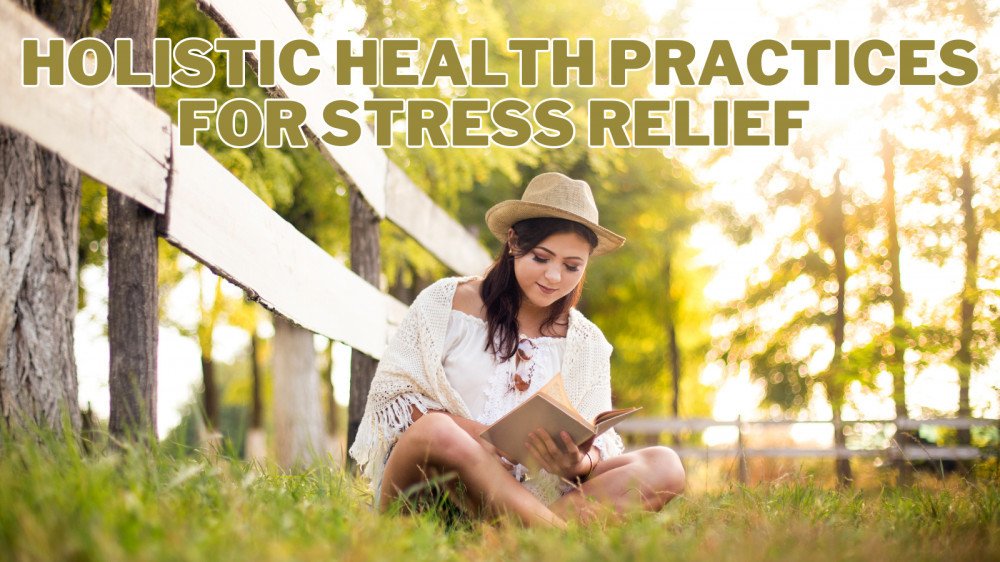Holistic healing techniques focus on treating the whole person—mind, body, and spirit—rather than just addressing symptoms. For stress relief, these methods can help individuals restore balance and promote overall well-being.

1. Mindfulness and Meditation
- Mindfulness encourages staying present and aware of your thoughts, feelings, and bodily sensations without judgment. Practices like mindfulness meditation can help you detach from stressors and reduce anxiety.
- Deep Breathing: Simple breathing exercises like diaphragmatic breathing (or belly breathing) activate the parasympathetic nervous system, which helps reduce stress.
- Guided Meditation: Listening to a guided meditation, either through apps or recordings, can help focus the mind, relieve tension, and increase emotional resilience.
2. Yoga and Tai Chi
- Yoga integrates physical postures, breathing exercises, and meditation to promote flexibility, strength, and mental clarity. Different styles of yoga, such as Hatha or Restorative, can be particularly calming.
- Tai Chi: This ancient martial art emphasizes slow, flowing movements combined with deep breathing. It’s excellent for reducing stress, improving balance, and increasing mindfulness.
3. Aromatherapy
- Essential oils, such as lavender, chamomile, and eucalyptus, can have a calming effect. Diffusing essential oils or using them in massage oils can help reduce feelings of stress and anxiety.
- Aromatherapy Baths: Adding a few drops of essential oil to your bath can promote relaxation.
4. Herbal Remedies
- Adaptogenic herbs like Ashwagandha, Rhodiola, and Holy Basil can help the body manage stress by balancing hormone levels and supporting the adrenal glands.
- Chamomile and Lavender Tea: Both herbs have gentle sedative properties and are often used to reduce anxiety and help with sleep.
5. Sound Healing
- Binaural Beats: Listening to specific frequencies that can induce a relaxed state or enhance focus.
- Solfeggio Frequencies: These are ancient tones said to harmonize and heal the body and mind.
- Sound Bath: The use of gongs, singing bowls, or other instruments can help clear negative energy and promote deep relaxation.
6. Acupuncture and Acupressure
- Acupuncture: Inserting very fine needles into specific points on the body can stimulate the body’s energy (Qi) and help reduce stress, improve sleep, and boost mood.
- Acupressure: Applying pressure to the same points as acupuncture can be done at home to promote relaxation and relieve stress.
7. Nutrition and Hydration
- A balanced diet rich in fruits, vegetables, and whole grains can support your body’s stress response. Avoiding excessive caffeine, sugar, and processed foods can help prevent stress from worsening.
- Hydration: Dehydration can exacerbate stress and fatigue. Drinking enough water throughout the day can help maintain energy levels and reduce physical tension.
8. Energy Healing (Reiki, Healing Touch)
- Reiki is a Japanese practice that involves the transfer of universal energy from the hands of a practitioner to the patient. It is believed to promote balance and relieve stress.
- Healing Touch: Similar to Reiki, Healing Touch involves gentle touch or near-touch to help restore balance and calm the nervous system.
9. Journaling
- Writing about your thoughts and emotions can be a therapeutic release. Expressing stress and worries on paper often provides clarity and can be a form of emotional release.
- Gratitude Journaling: Focusing on positive aspects of life can shift the mindset and reduce stress over time.
10. Nature Therapy (Ecotherapy)
- Spending time in nature, whether it’s walking in the woods, sitting by the ocean, or gardening, can help reset your nervous system and improve mental clarity.
- Forest Bathing (Shinrin-yoku): This Japanese practice involves immersing yourself in a forest environment, focusing on the sights, sounds, and smells to reduce stress and promote well-being.
11. Massage Therapy
- Regular massages, such as Swedish or deep tissue, can relax muscles, reduce tension, and stimulate the release of endorphins, the body’s natural stress relievers.
- Reflexology: Applying pressure to certain points on the feet or hands can help promote overall relaxation and relieve tension.
12. Visualization and Creative Expression
- Visualization involves imagining peaceful and positive scenarios to reduce stress and anxiety. This can be done as part of a meditation practice.
- Art Therapy: Engaging in creative activities such as painting, drawing, or even crafting can serve as a form of stress release and self-expression.
13. Sleep Hygiene
- Establishing a routine that promotes good sleep is essential for managing stress. Practices include maintaining a consistent sleep schedule, creating a calming bedtime routine, and reducing screen time before bed.
